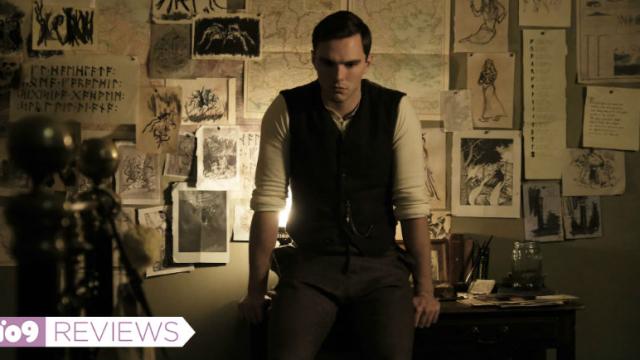From the moment Tolkien began, I found myself continually asking the same question: Why is this a movie? Of course, we all know who J.R.R. Tolkien is. He’s one of the most beloved fantasy writers of all time, responsible for creating one of the greatest literary worlds ever. Plus many of us, myself included, don’t know how he got to that point, so there’s a curiosity to be sure. But was the story going to be interesting enough to justify a whole movie?
The answer is complicated and the main struggle at the heart of Tolkien, a new biopic directed by Dome Karukoski starring Nicholas Hoult (X-Men) as the author and Lily Collins (The Mortal Instruments) as Edith Bratt, his potential love interest/fellow foster child who lives with him. That sounds weird, but it’s just one example of why Tolkien’s life has become a movie.
Tolkien lost his mother at a young age so he and his brother went to live with a foster parent. This parent also took in other children, such as Edith. So, in Tolkien, the story of the eventual author growing up in that difficult situation is juxtaposed with the older version of Tolkien during World War I.
There he’s sick, dug deep into the trenches, and on some kind of quest with a trusty companion named Sam (Craig Roberts) by his side.
If that last part sounds familiar, it should. It’s obviously presented as an inspiration for the Frodo/Sam relationship in The Lord of the Rings, and the entire film is filled with these sorts of connections.
It’s always a welcome aside, though eventually, it’s hammered over our heads a little too much. Even in the most seemingly innocuous scenes, there are lines of dialogue, visual cues, and eventually full visions (mostly induced by the horrors of war) from Tolkien’s imagination, all of which continue to build toward this grand idea of Middle-earth, hobbits, a ring, and more.
That’s why the audience is watching Tolkien, after all. They want to know how he came up with The Hobbit, The Lord of the Rings, and all their related works. But while those nods are throughout the movie, they aren’t the main drive of the story. As Tolkien grows up, he forms a tight group of friends (a fellowship, as it were) with some of boys at school. These boys grow up together, support each other and basically become a family. Their relationship is one of the bright spots in Tolkien, as well as a major problem.
On the positive side, all the characters (played by Hoult, Anthony Boyle, Patrick Gibson, and Tom Glynn-Carney) feel real and very much of their time. They’re flawed but interesting, so you root for them. However, that realistic friendship never feels grand or unique enough for what it’s trying to inspire. They’re just boys being boys, talking about art, life, love, all those kind of things, and living by a mantra to seize the day whenever the opportunity arises.
That’s great, but the grounded stakes derail other strands of the film, such as Tolkien’s obsessions with storytelling and language. Later, Tolkien’s penchant for words comes up again when the film almost fast forwards to Tolkien becoming his literary legend self, but there’s a long stretch of the film that feels disjointedly melodramatic.
Those push and pulls impact other aspects of story too, such as the war scenes, Tolkien’s romance with Edith, the Middle-earth teases and the knowledge of where it’s all headed. Karukoski has some solid ideas in the film but only a hint of how this story of friendship, perseverance, art, and love should fit together for it all to make sense that Tolkien wrote The Hobbit. The whole film feels like it’s having an argument with itself, something like this:
“Tolkien had a tight-knit group of friends.”
“OK, that makes sense.”
“He loved creating languages.”
“Oh perfect, because he did that with the books. What else?”
“He was in love with an orphan he grew up with.”
“Well, that’s nice, but I’m not sure how it fits with everything else. Carry on though.”
“People told him stories about dragons.”
“Wait, did he write stories about dragons or did they tell him the stories?”
“In the movie, they tell him the stories and he occasionally drew them.”
“You’re losing me.”
“He saw Sauron once.”
“Wait. what?”
The movie feels like a back and forth where some pieces fit beautifully, while others are forced and some are simply bad.
A bright spot for the film as a whole is that everyone gives very strong performances, especially Hoult and Collins. The two leads play their characters with a joyous innocence that evolves into a stoic maturity. We see them grow into themselves as the years pass and it helps us emotionally connect with their characters. In particular, Hoult has some scenes later in the film that nearly bring everything together based simply on his acting alone. And yet, because the story hasn’t quite earned those big connections, they fall just short.
Tolkien isn’t necessarily a bad movie, it’s just a messy one. Parts of it feel relevant and emotional, while others feel distant and disjointed. Ultimately, though, if Tolkien wasn’t “Tolkien” this story of a gifted orphan who went to school, fought in a war, came back and found a career as a writer wouldn’t feel as magical as the movie wants it to feel. It tries its damnedest, which gives it some merit, but ultimately, never grasps that ring.
Tolkien opens June 13 in Australia.
